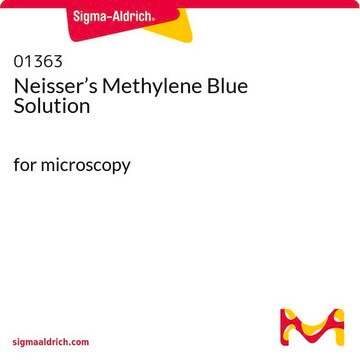M4159
Methylene Blue hydrate
suitable for nucleic acid staining, BioReagent
Synonym(s):
3,7-Bis(dimethylamino)phenothiazin-5-ium chloride xhydrate, Methylene Blue monohydrate, Methylene blue, Nucleic acid staining reagent
About This Item
Recommended Products
grade
for molecular biology
Quality Level
product line
BioReagent
form
powder
technique(s)
nucleic acid detection: suitable
solubility
water: 1 mg/mL (dark blue)
suitability
suitable for nucleic acid staining
storage temp.
room temp
SMILES string
O.[Cl-].CN(C)c1ccc2N=C3C=C\C(C=C3Sc2c1)=[N+](/C)C
InChI
1S/C16H18N3S.ClH.H2O/c1-18(2)11-5-7-13-15(9-11)20-16-10-12(19(3)4)6-8-14(16)17-13;;/h5-10H,1-4H3;1H;1H2/q+1;;/p-1
InChI key
WQVSELLRAGBDLX-UHFFFAOYSA-M
Looking for similar products? Visit Product Comparison Guide
General description
Application
Features and Benefits
- Less hazardous than staining with ethidium bromide
- Viewable in visible light
- Fast and easy to use
related product
Certificates of Analysis (COA)
Search for Certificates of Analysis (COA) by entering the products Lot/Batch Number. Lot and Batch Numbers can be found on a product’s label following the words ‘Lot’ or ‘Batch’.
Already Own This Product?
Find documentation for the products that you have recently purchased in the Document Library.
Customers Also Viewed
Protocols
Suitable for use in DNA and RNA staining.
Our team of scientists has experience in all areas of research including Life Science, Material Science, Chemical Synthesis, Chromatography, Analytical and many others.
Contact Technical Service




